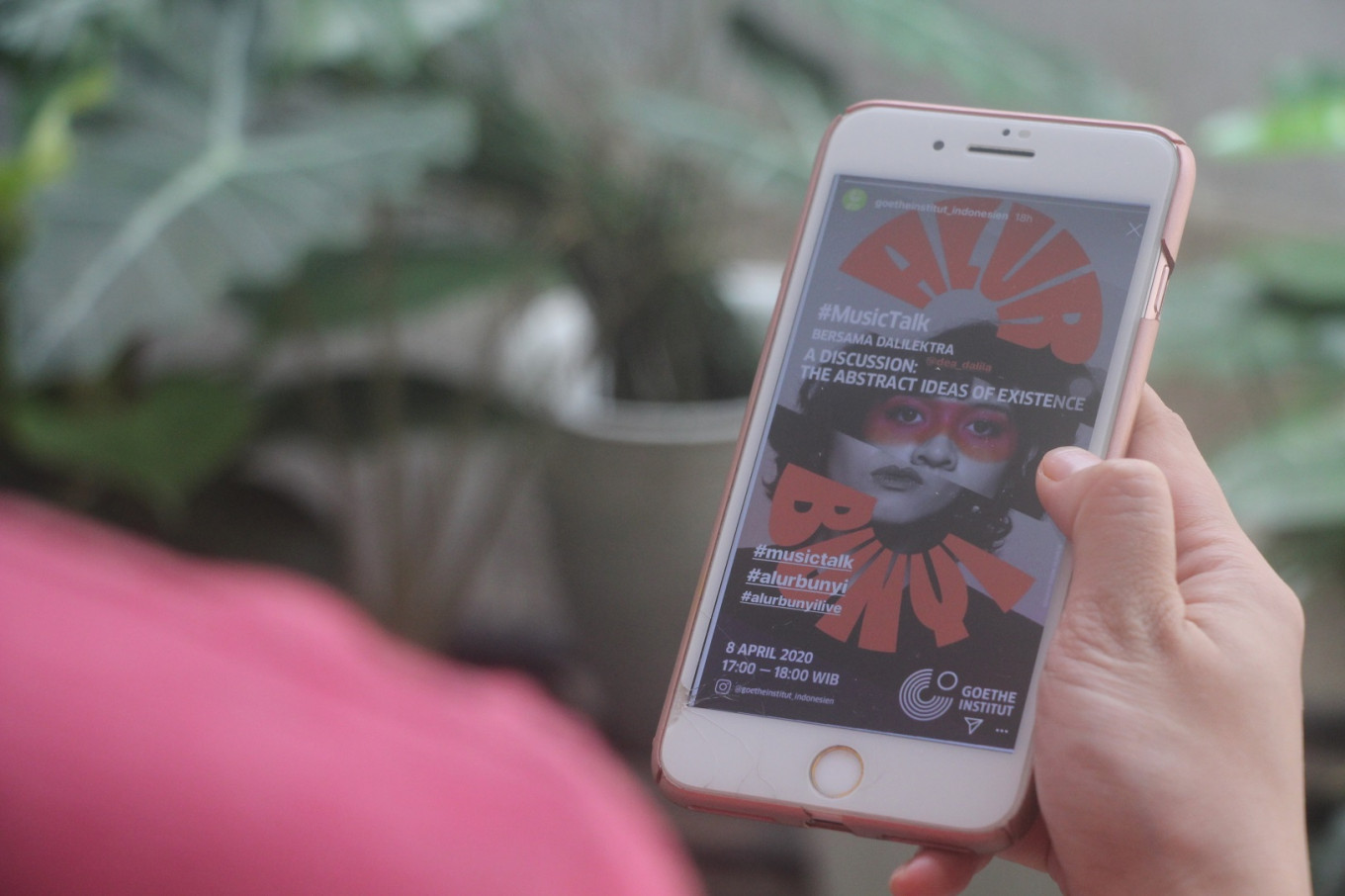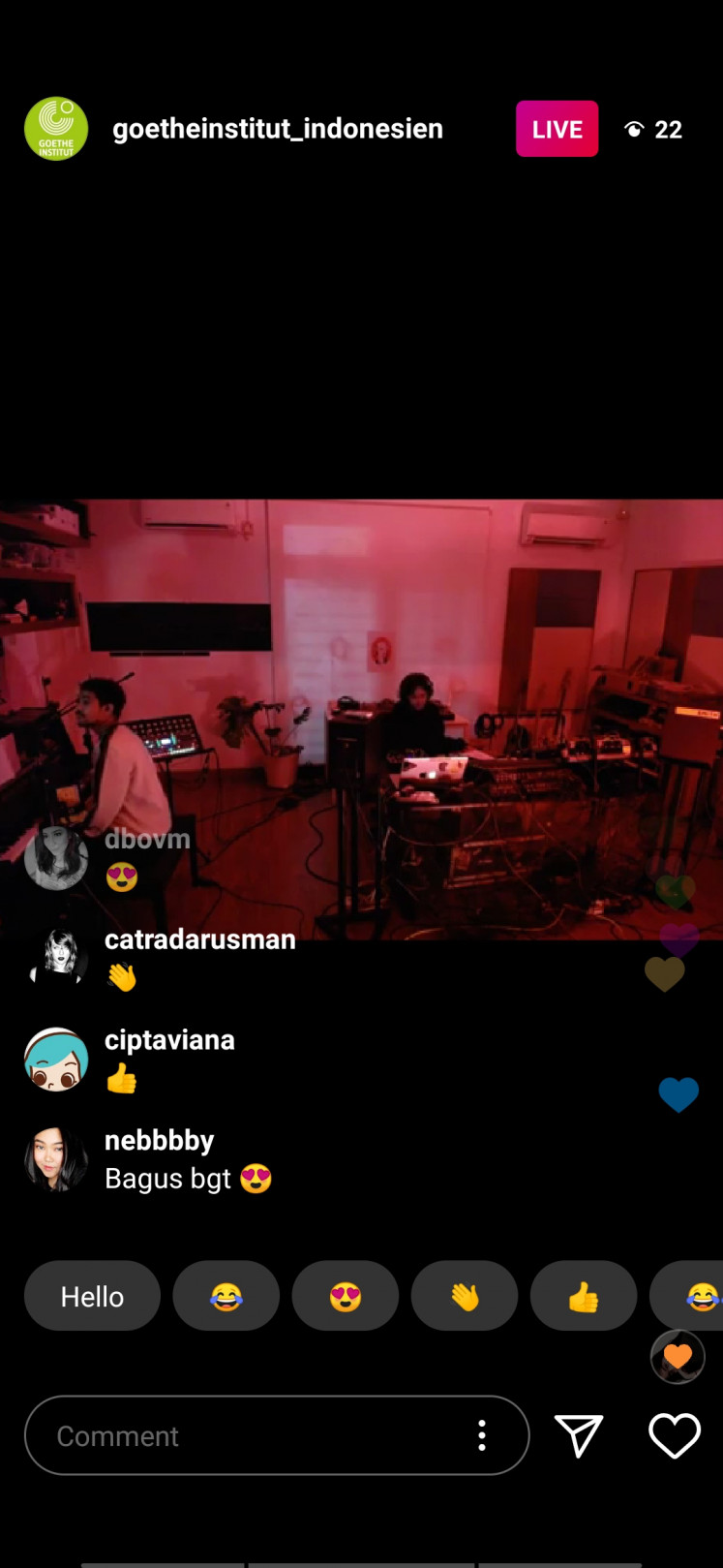Popular Reads
Top Results
Can't find what you're looking for?
View all search resultsPopular Reads
Top Results
Can't find what you're looking for?
View all search resultsDalilektra takes audience on existential wandering with Goethe-Institute 'live'
Concerts, conferences, and coffee shop discussions have been cancelled because of the coronavirus, so what are connoisseurs of culture to do? Head online, of course.
Change text size
Gift Premium Articles
to Anyone
W
hen the Goethe-Institut Indonesia closed its doors because of the epidemic and cancelled a string of events, it swiftly moved online to capitalizing on the number of people heading to the internet for their cultural fixes.
The first segment to kick off in April was #MusicTalk, the online version of the German cultural institute's "Alur Bunyi" (Sound Flow) concert series highlighting experimental electronic acts from Germany and Indonesia.
"Alur Bunyi" has been redesigned for 2020 as a weekly performance live streamed on Instagram @goetheinstitut_indonesien. Its first session on April 8 featured vocalist Dea Dalila, better known as Dalilektra, followed by musician Aksan Sjuman on April 15 and with singer-songwriter Puti Chitara of Barasuara to appear next week on April 22.
Dalilektra’s set on Wednesday afternoon was accompanied by Nara Anindyaguna, one-half of the electronic duo Random Brothers by Blood (the other half being Nara's brother Randy Danistha).
The Dalilektra-Nara pairing performed their hour-long concert from 4 p.m. to 5 p.m. at STEVESMITH Music Production, the Random Brothers’ music studio in Cinere, South Jakarta. Using a modular synthesizer to tune vibrations, the duo's show was a musical rendition based on Dalilektra’s newly released book, Nomadic Existence: Astral Bodies.
The studio lights were dimmed and the space bathed in a soft red glow before the performance began.
Dalilektra’s ethereal voice lent the performance a striking contrast to balance the cold, impersonal hums and thrums of the synthesizer, a delicate equilibrium between the primal and unnatural.
The vocalist said that the first of the two songs, as yet untitled, was about human beings and our need to rest and just let go.
“It’s basically a response to the present-day situation, that we should just rest and let the Earth return to a state of purity,” she told her virtual audience.
The second song also referred to the same theme of humanity and human existence, which is also a theme in her book .
Up next was not exactly a song per se, but rather several passages from Nomadic Existence narrated to musical accompaniment. This segment was decidedly more contemplative, with the first line encouraging listeners to abandon their pasts and thoughts to better understand their existential meaning.
Dalilektra's narration spoke of walls and of isolation, of things seen only with closed eyes. It was a welcome moment of self-reflection on mortality and purpose for those watching from their isolation at home.
The musical accompaniment was also appropriately contemplative, with melodies substituted for hums.
Later, the composition switched into a gentle piano number, which when coupled with the haunting vocals and lyrics, sound as if it is in a different realm, away from the chaos and grief of today.
However, at one point the fantasy was abruptly broken by a technical issue that ended the stream, although it was soon back up and running shortly after.
Dea channeled a touch of Lana Del Rey in English, and was more evocative of days gone by when she sang in Indonesian. The lyrics spoke of a world rid of its naivety and the wounded, quite a departure for those who remember the singer's past as Dea Azkadi in teenybopper-friendly HIVI!
Dea said that she was inspired in her music by composer Ryuichi Sakamoto, while noting that she was also a fan of anime and novels. Other influences included Joe Hisaishi's film scores for Studio Ghibli.
“[Nomadic Existence] has been in the works for more than eight years, as the illustrations are mine as well as the ‘codes’ that make up a kind of alphabet. The music came later, after the book had been published,” she explained.
These "codes" had their own meanings, which Dea said was “a bit sci-fi”.
Nomadic Existence is the first volume of a planned trilogy and can be purchased at POST Bookshop in Pasar Santa or by direct-messaging @nomadic__existence on Instagram. Its scheduled launch at Kinokuniya was postponed because of the outbreak.
Dea said that going forward, she would like to experiment with Indonesian music, including sinden (Javanese vocalization).
“My first experience with ‘nyinden’ was in a previous project with STEVESMITH Productions for the soundtrack to Mangkujiwo," she said, referring to the verb form of sinden.
"It was rather challenging, but I did it anyway just to try it out. So, maybe in the upcoming book, there will be a Javanese vibe to it."












